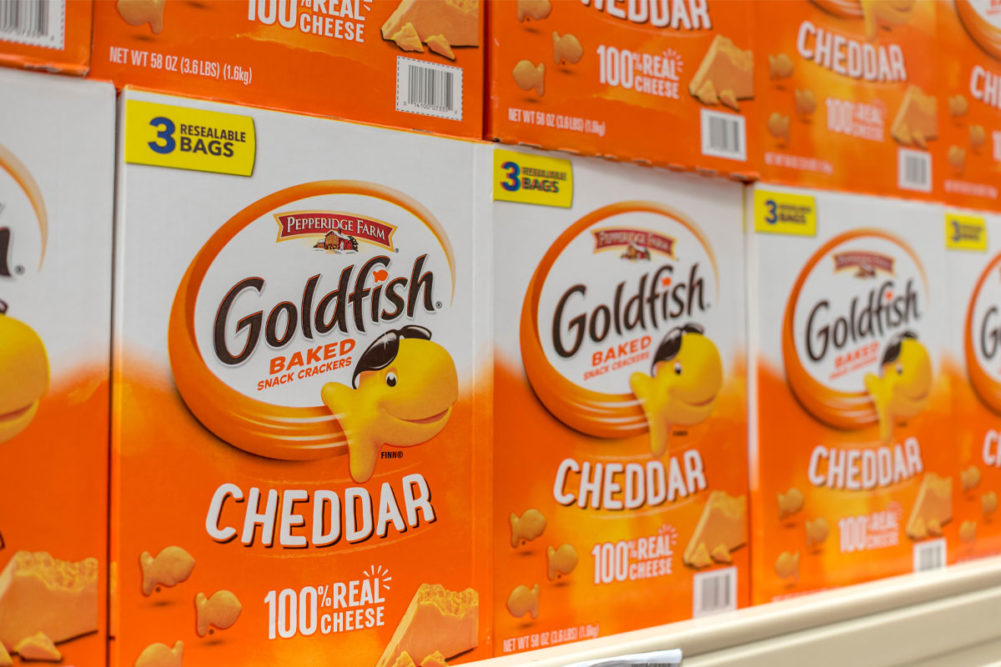CAMDEN, NJ. — Campbell Soup Co. struggled to successfully thread the needle as it continued efforts to mitigate inflation in the fiscal year ended July 31.
“In the fourth quarter, we continued our efforts to mitigate inflation … through a combination of targeted price increases and trade optimization, as well as productivity improvements, primarily in our supply chain, cost-saving initiatives and a continued focus on discretionary spending across the organization,” Mark Clouse, president and chief executive officer of Campbell, said in a Sept. 1 conference call with securities analysts to discuss fourth-quarter and fiscal 2022 financial results.
“A particularly competitive segment is total salty snacks, where we were the only major player who grew unit share in the fourth quarter as we’ve worked hard to keep price and promotion balanced as supply recovered,” Clouse said. “Goldfish continues to deliver exceptional results also, driven by relevant innovation and award-winning marketing.
“Organic net sales in our Snacks division increased 6%, driven by sales of our power brands, which were up 9%. Snacks sales increased due to gains in salty snacks, primarily Kettle brand, and Cape Cod potato chips, as well as in cookies and crackers, primarily Goldfish crackers. Inflation-driven pricing and sales allowances were partially offset by increased promotional spending and volume declines.”
For the full fiscal year, Snack unit sales were $3.96 billion, up 3% from $3.86 billion in the previous fiscal year. In the Snack unit, net sales in the fourth quarter ended July 31 were $1.05 billion, up 6% from $995 million in the fourth quarter of the previous fiscal year.
Net earnings attributable to Campbell Soup Co. in the fiscal year ended July 31 were $757 million, or $2.51 per share, down 24% from $1 billion, or $3.31 per share, a year ago. Net sales of $8.56 billion were up narrowly from $8.48 billion a year ago.
“Inflation and other factors had a negative impact of 810 basis points, with the majority of the impact driven by cost inflation as overall input prices on a rate basis increased by approximately 15%, which was relatively consistent with the prior quarter,” Clouse said. “Lastly, unfavorable volume and mix had a negative impact of 170 basis points in the quarter.”
When pressed by an analyst about the timing of pricing actions and promotional activity, Clouse said the company rolled out the third wave of its pricing in the final month of fiscal 2022.
“And that was really designed to ensure that we had the pricing fully reflected and in place as we stepped off in fiscal ‘23,” he said. “However, in a month where you’re executing pricing, I do think we saw a little bit slower, especially as it relates to inventory recovery as we executed that. The good news is, as we project in the Q1, that’s probably a couple of hundred basis points of difference that I think will move into the Q1 timing.
“Perhaps even more encouraging is the continued strength of our growing, highly relevant and unique portfolio of power brands. Taking a closer look at these brands, end market consumption grew 11% versus the prior year. And on a three-year basis, consumption grew 26%, with double-digit growth across all our power brands versus three years ago. With respect to share, our power brands held dollar share in the quarter versus the prior year, with share gains on Kettle Brand, Cape Cod, Snack Factory Pretzel Crisps and Pepperidge Farm cookies.”
In the fourth quarter companywide, net earnings attributable to Campbell Soup Co. totaled $96 million, or 32¢ per share, down 67% from $288 million, or 95¢ per share, in the year-ago quarter in which earnings more than tripled primarily as result of at-home restrictions related to the COVID-19 pandemic. When compared with fourth-quarter results in fiscal 2020, fourth-quarter net earnings in fiscal 2022 were up 12% from $86 million, or 28¢ per share.
In the Meals and Beverage unit fiscal year sales were flat at $4.61 billion. In the fourth quarter ended July 31, Meals and Beverages unit sales were up 6% to $935 million from $878 million in the year-ago quarter.
“I feel tremendous about the progress we’re making on supply chain, we still have a few businesses where material availability has slowed full supply recovery,” Clouse said. “That’s primarily Lance, Late July and V8, where each of them have their own kind of material availability challenge that will take us some time into ‘23 to fully recover.”
Clouse added as Campbell Soup emerges from the last three years of COVID-19 pandemic influence, the company is pleased with the share for most of the key brands remaining at or above fiscal 2019 levels.
“While as we expected in the fourth quarter, we have experienced some select share pressure, this sustained share growth versus pre-pandemic levels is a positive sign that we’re emerging with a stronger portfolio of brands as we head into 2023,” he said.


